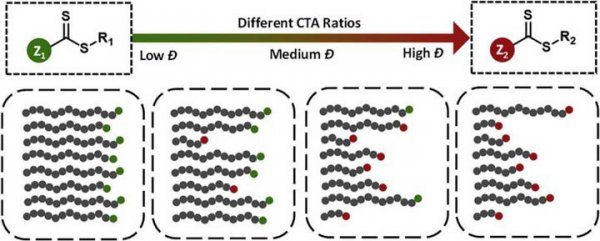According to foreign media reports, researchers at the Swiss Federal Institute of Technology in Zurich (ETH) have developed a new method of producing polymers of different lengths, which can pave the way for this new polymer material to be used in previously unachievable applications.
It is hard to imagine that there are no materials made of synthetic polymers in daily life. Clothes, auto parts, computers or packaging products are all made of polymer materials. And there are many polymers in nature, such as DNA or protein.
Polymers are built on a common architecture: they are composed of basic building blocks called monomers. Polymer synthesis requires linking monomers together to form long chains. Imagine putting glass beads on a rope to form chains of different lengths (and weights).
An important process for producing polymers is free radical polymerization (FRP). The chemical industry uses FRP to produce 200 million tons of various types of polymers each year, such as polyacrylic acid, polyvinyl chloride (PVC) and polystyrene. Although this production method has many advantages, it also has its limitations. FRP produces uncontrollable mixtures of polymers of varying lengths, in other words, with a high degree of dispersion. Dispersion is an index to measure whether the polymer chain length in a material is uniform. The performance of the material depends on the dispersion to a large extent.
In the daily use of polymers, both low-dispersion and high-dispersion polymers are required. In fact, high dispersion is even an advantage for polymers used in many high-tech applications such as pharmaceuticals or 3D printing.
However, if chemists want to produce polymer materials with special properties, they must first be able to adjust the degree of dispersion as needed, so that they can produce various types of polymer materials, which either contain uniform polymer species. That is, low dispersion, or high dispersion, can be dispersed with polymers of different lengths. However, until now, it is almost impossible to achieve.
Under the leadership of Athina Anastasaki, professor of polymer materials in the Department of Materials, a group of researchers has developed a method to control free radical polymerization, so that researchers can systematically and completely control the dispersion of polymer materials.
In the past, in order to be able to control the free radical polymerization process to some extent, chemists would use a single catalyst to ensure that the length of the polymer chain became uniform, but could not control the overall dispersion as expected.

(Image source: ETH Zurich)
Now, researchers at ETH Zurich have used two catalysts with different effects at the same time, one with high activity and one with low activity, so that the dispersion can be precisely adjusted according to the mixing ratio of the two catalysts. If there are more catalysts with higher activity, a more uniform polymer will be produced, that is, the degree of dispersion of the material will be lower. Then, if there are more catalysts with lower activity, a large number of different polymer molecules will be formed, resulting in a higher degree of material dispersion.
This research means that Anastasaki and the R&D team have laid the foundation for the research and development of new polymer materials. In addition, their process is scalable, not only for laboratories, but also for a large number of substances. Another advantage of this process is that even polymers with a high degree of dispersion can continue to grow once the polymerization process is completed, which was impossible to achieve before.
This efficient and scalable method has aroused interest in the industry, and the polymers produced by this new process can be used in medicine, vaccines, automobiles, cosmetics or 3D printing industries. (Author: Yuqiu Yun)
Nonwoven Face Mask,Earloop Nonwoven Mask,Protective Nonwoven Face Mask,Nonwoven Folding Face Mask
Chongqing Yilun Sanzi new packaging Co., Ltd , https://www.yilunmask.com
